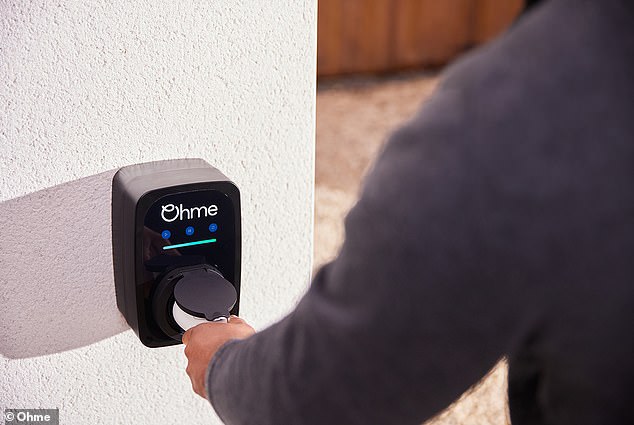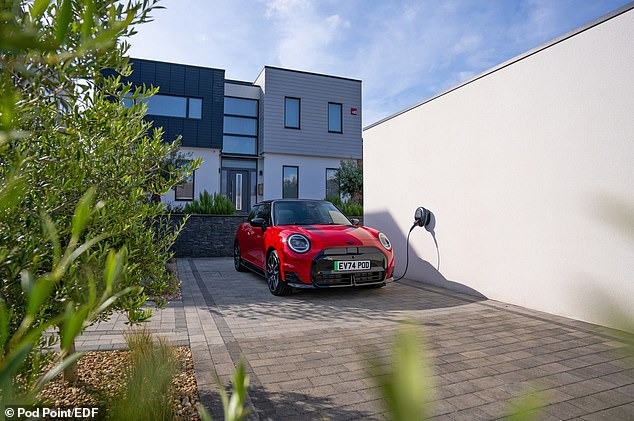Table of Contents
- Shopping on the high street to pay in installments, industry firsts – new tips you need to know
With electric vehicle sales up more than 10 percent this year, there will be several drivers who will want and need to have a home charger installed.
There will also be a cohort of potential buyers interested in purchasing an electric car, but who don’t know where to start when it comes to getting a home charger.
Innovative new partnerships are emerging to make purchasing a charger easier, faster and more affordable, including the ability to purchase one at a retail store…
Shoppers who want a smart home charger for their electric vehicle can buy from Ohme on Currys’ website or in 50 of its stores and Ohme will take care of everything – quotes, surveys and installation.

Home charging provider Ohme has teamed up with electricity retailer Currys, which will sell electric vehicle chargers directly to customers.
Currys now offers electric vehicle charging facility
Installing electric vehicle charging has potentially become easier as you will now be able to buy a home charger on the high street.
Home charging provider Ohme has teamed up with electricity retailer Currys, which will sell electric vehicle chargers directly to customers.
Shoppers who want a smart home charger for their electric vehicle can buy from Ohme on Currys’ website or in 50 of its stores and Ohme will take care of everything – quotes, surveys and installation.
Ohme smart chargers allow you to connect to the national grid in real time and will automatically adjust charging times to ensure drivers can take advantage of low-cost off-peak charging times.
Home charging can give you big savings.
The average UK driver driving 6,800 miles a year on smart charging with an off-peak tariff such as Intelligent Octopus Go at 7p/kWh on a typical EV would pay just £127.50 for a year of driving.
On the standard variable tariff of 24.5p/kWh, that same annual mileage would cost £416.
In comparison, the same mileage on an equivalent petrol car would cost the driver more than £1,100.
How much does it cost to install?
The price of the untethered ePod is £949, while the tethered Home Pro (with cable attached) costs £999.
Both prices include Ohme’s standard installation, which covers 80 to 85 percent of installations.
Examples of a non-standard installation would be if someone needs to upgrade their fuse box or if their charger is in a garage at the back of the garden (i.e. a significant distance from the house).
How long is the waiting time?
Wait time typically depends on the time it takes for the buyer to complete Ohme’s online survey, take images, and check availability.
Once all this is done, the average wait time is around two to three weeks, but sometimes it can be sooner, Ohme says.

The ‘Pod Point Plug and Power’ package will reduce the initial payment for the Pod Point Solo 3S charger and allow the remainder of the cost to be rolled into the EV tariff, an industry first.
New rate package x smart charger
Meanwhile, EDF and Pod Point have launched an industry-first EV home charger and tariff package that will help reduce upfront electricity costs.
The ‘Pod Point Plug and Power’ package will reduce the initial payment for the Pod Point Solo 3S charger and allow the rest of the cost to be integrated into the electric vehicle tariff.
Instead of costing £1,099, the Pod Point Solo 3S will cost just £499 and the remaining cost of the charger will be spread over two years, with a monthly payment built into the EDF tariff.
The tariff, which uses 100% carbon-based electricity, is priced at £2,139 a year for the average driver of a dual-fuel electric vehicle at home, and offers customers cheap nightly rates, with five hours of electricity on off-peak hours between 12 and 5 in the morning. both at home and in your car, at a price of 8.49 pence per kWh.
For the average motorist, charging with Pod Point Plug & Power will save them £538 a year compared to petrol. And compared to using the public charging network, EV drivers charging on the tariff would save £460.



